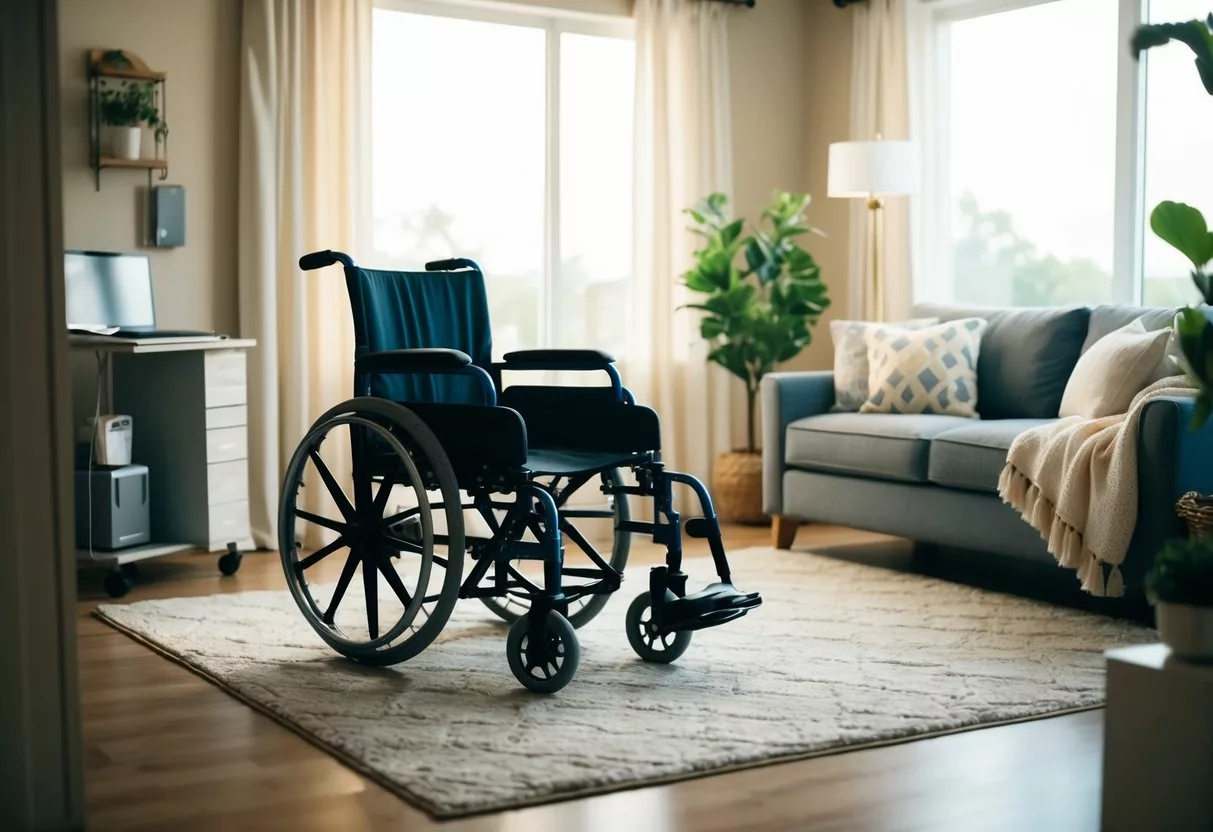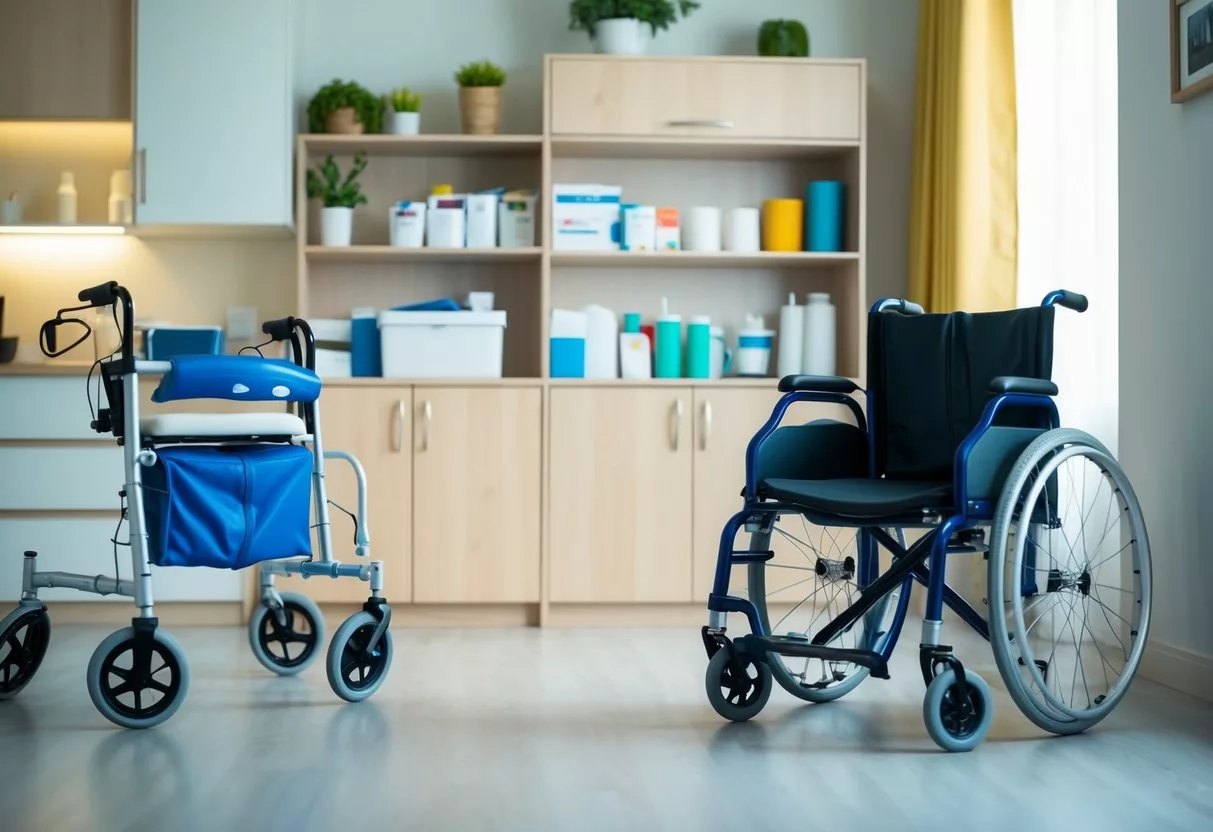Home health care services allow people to get medical care in their own homes. These services can help patients recover from illness or injury without staying in a hospital. They also assist those with chronic conditions to manage their health at home.

Home health care services can include nursing care, physical therapy, and help with daily tasks. A doctor usually orders these services as part of a care plan. Trained professionals visit patients’ homes to provide the needed care.
Many Medicare-certified home health agencies offer these services. Medicare may cover some home health care costs for eligible patients. This can make it easier for people to get the care they need without leaving their homes.
Understanding Home Health Care

Home health care provides medical and personal assistance to people in their homes. It helps patients recover from illness, manage chronic conditions, and maintain independence.
Types of Home Health Care Services
Home health care includes many services. Skilled nursing care involves tasks like wound care and medication management. Physical, occupational, and speech therapy help patients regain abilities.
Home health aides assist with daily activities such as bathing and dressing. Medical social workers offer counseling and help connect patients to community resources.
Some patients need short-term care after surgery. Others require ongoing support for chronic illnesses. Care plans are tailored to each person’s needs.
The Role of Home Health Agencies
Home health agencies coordinate care between patients, families, and healthcare providers. They hire and train staff to deliver quality care. Agencies ensure services meet medical standards and follow doctor’s orders.
Home health agencies handle scheduling, billing, and paperwork. This lets families focus on their loved ones. They also work with insurance companies to cover eligible services.
Agencies monitor patient progress and adjust care plans as needed. They aim to help patients reach their health goals and improve quality of life.
Eligibility and Coverage

Medicare and Medicaid provide home health care coverage for eligible individuals who are homebound. Specific criteria determine who qualifies and what services are covered.
Defining Homebound Status
To be considered homebound, a person must have trouble leaving their home without help. This could be due to illness, injury, or a health condition. Leaving home must require a lot of effort.
People who are homebound can still go out for:
- Medical treatments
- Religious services
- Adult day care
Homebound status is key for getting home health care coverage. A doctor must certify that the person is homebound. They also need to say the person needs skilled nursing or therapy.
Medicare and Medicaid Eligibility
Medicare covers home health care for those who meet certain rules. To get Medicare coverage, a person must:
- Be under a doctor’s care
- Need skilled nursing or therapy
- Be homebound
Medicare Part A or Part B can cover home health care. There’s no need for a hospital stay first under Part B. Medicare Advantage plans also cover these services.
Medicaid rules for home health care vary by state. Many states offer home care services to those who qualify based on income and need.
Services Provided by Home Health Care

Home health care offers a wide range of services to help people stay independent in their homes. These services cover both medical care and daily living assistance.
Skilled Nursing and Therapy Services
Skilled care includes services from licensed nurses and therapists. Nurses can give shots, change dressings, and check vital signs. They also teach patients and families about medications and care plans.
Physical therapists help patients regain strength and mobility. They create exercise plans and teach proper movement techniques. Occupational therapists focus on daily tasks like dressing and eating. They may suggest home changes to improve safety.
Speech therapists work with patients who have trouble speaking or swallowing. They use exercises and tools to improve communication skills.
Wound care is another key service. Nurses clean and dress wounds to prevent infection and promote healing.
Personal and Companion Care
Personal care aides help with activities of daily living. This includes bathing, dressing, and grooming. They may also assist with light housekeeping and meal preparation.
Companion care provides social interaction and emotional support. Caregivers may play games, read books, or simply chat with clients. They can also help with errands and appointments.
These services aim to improve quality of life and reduce isolation. They allow people to stay in their homes longer and maintain their independence.
Navigating Medicare for Home Health Care

Medicare offers coverage for home health care services under certain conditions. Knowing the specifics of this benefit can help you access needed care in your home.
Understanding the Home Health Benefit
To qualify for Medicare’s home health benefit, you must be homebound and need skilled care. Homebound means leaving home is very difficult and requires help. Skilled care includes nursing, physical therapy, or speech therapy.
You also need a doctor to certify you need home health care. The care must come from a Medicare-certified agency. These agencies meet Medicare’s quality and safety standards.
Medicare covers home visits from nurses, therapists, and home health aides. It also pays for medical supplies used in your care. The benefit does not include 24-hour care or help with daily tasks like cooking or cleaning.
Medicare Part A and Part B Services
Both Medicare Part A and Part B can cover home health services. Part A typically covers care after a hospital stay. Part B covers ongoing care if you haven’t been in the hospital.
Covered services include:
- Skilled nursing care (part-time or intermittent)
- Physical therapy
- Occupational therapy
- Speech therapy
- Medical social services
- Home health aide services (part-time or intermittent)
Medicare does not limit the number of home health visits. But a doctor must review your plan every 60 days. You pay nothing for covered home health care. But you may owe 20% for medical equipment.
Private insurance may offer additional coverage beyond Medicare. Check your policy for details on home health benefits.
Additional Services and Support

Home health care offers more than just medical assistance. It also includes help with daily tasks and support for caregivers. These extra services aim to improve the patient’s quality of life and ease the burden on family members.
Housekeeping and Homemaker Services
Home health care often includes housekeeping and homemaker services. These tasks help patients maintain a clean and safe living environment. Services may include:
• Light cleaning (dusting, vacuuming, mopping) • Laundry and changing bed linens • Grocery shopping and meal preparation • Organizing medications
Homemaker services also assist with personal care tasks like bathing, dressing, and grooming. These services are vital for patients who struggle with mobility or cognitive issues.
Agencies may offer different levels of housekeeping support based on the patient’s needs and insurance coverage. It’s important to discuss specific services with the care provider.
Caregiver Education and Support
Caregiver education and support are crucial parts of home health care. These services help family members care for their loved ones more effectively.
Caregiver support programs may include:
• Training on medical procedures and equipment use • Guidance on medication management • Information about the patient’s condition and care needs • Stress management techniques • Respite care options
Many agencies offer workshops, one-on-one training, and written materials to educate caregivers. Some also provide support groups where caregivers can share experiences and advice.
Caregiver education helps reduce burnout and improves the quality of care patients receive at home. It’s an essential component of comprehensive home health care services.
Specialized Home Health Care

Specialized home health care focuses on providing tailored medical support for specific health conditions. It offers targeted care plans to address unique patient needs in a familiar home environment.
Dementia Care and Support
Dementia care at home helps patients maintain a sense of routine and comfort. Trained caregivers assist with daily tasks, medication management, and safety monitoring. They use memory aids and engage patients in cognitive exercises to slow mental decline.
Caregivers also help manage behavioral changes common in dementia patients. They create calm environments and use distraction techniques to reduce agitation. Family members receive education on dementia progression and coping strategies.
24-hour supervision may be necessary as the condition advances. Caregivers help prevent wandering and ensure patients eat, drink, and take medications as needed.
Hospice and Palliative Care
Hospice care focuses on comfort and quality of life for terminally ill patients. It provides pain management, symptom control, and emotional support. A team of doctors, nurses, and social workers creates personalized care plans.
Hospice services include:
- Pain and symptom management
- Emotional and spiritual support
- Help with personal care
- Medical equipment and supplies
- Respite care for family caregivers
Palliative care offers similar services but can begin earlier in an illness. It aims to improve quality of life for patients with serious, chronic conditions. This care can be provided alongside curative treatments.
Both hospice and palliative care support families through counseling and bereavement services. They help patients and loved ones navigate end-of-life decisions with compassion and dignity.
Accessible Transportation Services

Transportation is a key part of home health care. Many patients need help getting to doctor visits or running errands.
Non-emergency medical transportation (NEMT) is an important service. It helps people who can’t drive or use regular public transit.
NEMT providers offer rides in:
• Wheelchair vans
• Ambulances for non-urgent cases
• Regular cars and SUVs
Some home care agencies set up rides for clients. They work with local NEMT companies to make sure patients get where they need to go.
The Americans with Disabilities Act requires public transit to be accessible. This includes:
• Buses with wheelchair lifts
• Paratransit services for those who can’t use regular buses
Ride-hailing apps now offer accessible options too. Uber and Lyft have wheelchair-accessible vehicles in many cities.
For seniors, there are special services. Some towns have volunteer driver programs. Others offer low-cost taxi vouchers.
Good transportation is vital for health care access. It lets people stay independent and get the care they need.
Durable Medical Equipment and Supplies

Durable medical equipment (DME) helps patients live safely at home. It includes items like wheelchairs, hospital beds, and oxygen tanks.
DME is made to last and can be used many times. It’s different from disposable medical supplies, which are used once and thrown away.
Medicare Part B covers many types of DME if a doctor prescribes it. Patients may need to pay part of the cost.
Common types of DME include:
- Mobility aids (walkers, canes)
- Respiratory equipment (oxygen tanks, CPAP machines)
- Hospital beds
- Bathroom safety items (shower chairs, raised toilet seats)
Medical supplies are often used with DME. These can include:
- Wound care items
- Ostomy supplies
- Diabetic testing supplies
- Incontinence products
Many companies provide DME and supplies to patients at home. They often offer delivery and setup services.
Proper use of DME and supplies can improve a patient’s quality of life. It can help them stay independent and manage health conditions at home.
Quality and Safety Standards

Home health care services must meet strict standards to protect patients. Key areas include following regulations and using safe practices. These ensure high-quality care in people’s homes.
Regulation Compliance
Medicare-certified home health agencies must follow specific rules. They report on quality measures to the Centers for Medicare & Medicaid Services (CMS). These measures track things like:
- How well patients can move around
- If wounds are healing properly
- Whether patients need to go back to the hospital
Agencies also need state licenses. Each state has its own rules for home care. Some require extra training or background checks for workers.
The Joint Commission offers voluntary accreditation for home care groups. This shows they meet high standards. It looks at how they handle patient safety, infections, and staff qualifications.
Ensuring Safe Practice
Safe practices are crucial in home health care. Agencies train staff on infection control and proper use of medical equipment. They teach workers how to:
- Prevent falls
- Give medicines safely
- Spot signs of abuse or neglect
Quality care means checking on patients often. Workers track vital signs and symptoms. They report changes to doctors quickly.
Agencies use checklists and safety protocols. These help catch problems early. They also have plans for emergencies like power outages or bad weather.
Good communication is key. Care teams share info with patients, families, and doctors. This helps everyone work together for better health outcomes.
Comparing Home Health Care and Nursing Homes
Home health care and nursing homes offer different types of care for seniors and those with medical needs. Each option has its own advantages and considerations.
Home health care allows people to receive medical services in their own homes. A nurse or aide visits to provide treatments, help with daily tasks, and monitor health.
Nursing homes provide 24/7 care in a residential facility. They offer constant nursing care, meals, and assistance with daily living for those who need extensive support.
Key differences:
• Location: Home vs. residential facility
• Level of care: Periodic visits vs. round-the-clock care
• Independence: More independence at home vs. structured facility environment
Home health care can be good for those who need some help but can still live somewhat independently. It lets people stay in familiar surroundings.
Nursing homes are better for those who need constant medical care and supervision. They provide a safe environment with trained staff always available.
Cost is another factor. Home care is often cheaper for those who only need part-time help. Nursing homes can be more cost-effective for those needing full-time care.
The choice depends on the person’s health needs, preferences, and family situation. It’s important to consider all options carefully.
Frequently Asked Questions
Home health care services provide essential support for many patients. Medicare coverage, qualification criteria, and common services are key aspects to understand.
Who qualifies for home health care services?
Patients who need skilled care and are homebound qualify for home health care. A doctor must certify the need for these services.
Patients recovering from surgery, injury, or illness often meet these requirements. Chronic conditions like diabetes or heart disease may also qualify.
How much does Medicare contribute towards home health care?
Medicare covers 100% of approved home health care costs. This includes skilled nursing, therapy, and medical social services.
Patients may have copayments for medical equipment. Medicare does not cover 24-hour care or homemaker services.
What are the top-rated home health care services in major cities like San Antonio?
Top-rated agencies in San Antonio include Amedisys and Kindred at Home. These providers offer comprehensive skilled nursing and therapy services.
Local hospital systems like Methodist Healthcare also have highly-rated home health divisions. Ratings are based on patient surveys and quality measures.
What is the process for qualifying for home health care under Medicare?
The process starts with a doctor’s order for home health care. A face-to-face meeting with the doctor is required.
The home health agency then assesses the patient’s needs. They create a care plan with the doctor’s approval.
How extensive is Medicare’s coverage duration for home health care?
Medicare covers home health care for as long as it’s medically necessary. There’s no time limit if the patient continues to qualify.
Patients must be recertified by a doctor every 60 days. Care can continue if skilled services are still needed.
What are the most commonly provided services by home health care providers?
Common services include skilled nursing care and physical therapy.
Occupational and speech therapy are also frequently provided. Medical social services and home health aide care are additional options.
Wound care and medication management are often part of nursing services.